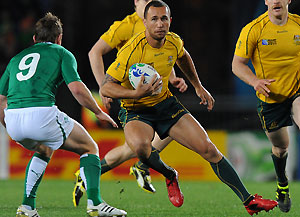
Wallabies player Quade Cooper runs during the Rugby World Cup Pool C match between Australia and Ireland at Eden Park, Auckland, New Zealand, Saturday, Sept. 17, 2011. (AAP Image/Dave Hunt)
In a column earlier this year I asked which World Cup/world championship is the second most important after FIFA’s World Cup. I argued that with multiple and competitive representatives spread over six continents, and a tournament that is considered the ultimate prize within that sport, rugby’s World Cup deserved the silver medal.
After all, basketball and hockey’s world championships and increasingly cricket’s World Cup merely preach to the converted, I thought – the first two somewhat overshadowed by their sports’ Olympic Games’ participation, and the latter lost in the midst of three forms of the game and too many insignificant internationals.
Has that opinion changed with the 2011 Rugby World Cup underway? Yes and no.
If the opening matches of the Rugby World Cup have taught us anything, it’s that the gap between the traditional powerhouses and the minnows is undoubtedly getting smaller.
Romania, Japan, USA, Namibia, Canada and co have at one point or another threatened more established rugby nations. No longer are the minnows consistently being walloped by cricket scorelines, such as the Wallabies’ 142-0 demolition of Namibia at the 1999 World Cup. They are edging ever closer, although slowly.
And the increasing competitiveness of countries such as Russia, Japan and the United States in particular will only help rugby establish more of a fanbase in markets that can significantly sway a sport’s economic wellbeing.
That growing presence will only cement and grow the World Cup’s reach and, therefore, importance.
But the current format of the Rugby World Cup doesn’t lend itself to creating strong momentum and, therefore, maximum return of attention, with games too spread out and too many insignificant pool matches in too few pools.
Despite their increased competitiveness, there is still an element of the tournament going through the motions as the powerhouses account for the rest in the pool stages. Combined with the drawn out format, it feels too elongated and insignificant for much of the early stages, which lessens its impact – certainly compared to the FIFA World Cup.
While rugby fans are likely to charge at me like the All Blacks on attack for saying so, this drawn out format and predictability are part of the reason for Channel Nine’s shabby Rugby World Cup coverage.
Beginning on the same weekend as the AFL and NRL finals, the World Cup was always going to put on the back burner somewhat.
But Channel Nine knows all too well that the latter stages of the tournament conveniently falls post-NRL finals; in that funny period of the year heading into summer when a number of the fringe codes put their best foot forward – Bathurst, Spring Racing Carnival etc.
So why bother giving the tournament the respect it deserves during the insignificant pool stage at this inconvenient period? It’s all about the latter stages in October as, barring upsets (not something the Rugby World Cup is renowned for), the Wallabies should be featuring in the semis with the likes of the All Blacks, Springboks, England and co.
But the strength of rugby and more so football World Cups is that in places like Australia they can and will preach and appeal to the masses, beyond the traditional heartlands.
So going back to my initial question on which is the second most important tournament, perhaps that can be proven by more intangible factors than representatives and contenders. Perhaps it comes down to a general mood that pervades the participating countries, albeit spread over multiple contents.
Despite the lacklustre pool stage, in a place like Adelaide, where rugby remains an outsider code misunderstood by a population that hasn’t grown up appreciating the game let alone the rules, pubs are decked out in Rugby World Cup paraphernalia and rugby fans and non-fans alike come together to watch live games.
The great strength of the Rugby World Cup is twofold. Firstly, how quickly it has grown in terms of its status within the game, having only started in 1987 at a time when rugby was still a few years off professionalism – and the room for growth as the minnows become more competitive. And secondly, how the tournament transcends the game’s traditional supporter bases.
As Fox Sports’ football pundit Andy Harper recently wrote in an article comparing the Socceroos and the Wallabies, “‘Rugger’ became the play-thing of the industrialists, landed gentry and, by extension, the universities.
“That “old boys’ network of professionals and industry captains (bankers, lawyers, accountants etc) that has underpinned rugby’s commercial acceptance.”
At domestic level that may well be the case – a game with strong pockets of support in a few areas, led first and foremost by the NSW ‘establishment’.
The game at domestic level doesn’t have the mass appeal it needs in enough pockets – see the inability to get a domestic professional competition going in Australia.
But through the Wallabies, rugby union is able to transcend those limitations. How this has happened is debatable. But perhaps it is in part thanks to the great legacies left by former Wallabies’; a respected winning culture, cultivating a strong and powerful brand.
Together with the Australian cricket team, it was the winning Australian national team that represented the country so strongly here and abroad – before the Socceroos were regularly World Cup qualifiers themselves and had achieved mainstream appeal.
This is the great strength of the Wallabies. Like the Socceroos, they have come to represent so much more than where their game stands.
And that’s part of the reason why the Rugby World Cup is the second most important tournament in the world, or in Australia, at least.
Follow Adrian on twitter @AdrianMusolino





























































































